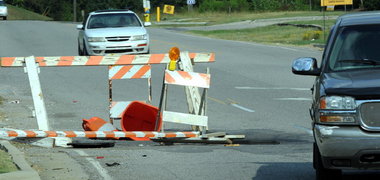Courtesy Beverly Taylor @ The Birmingham News
Welcome to the city of Lipscomb, Alabama, population 2,458. Located next door to the slightly larger city of Brighton (3,640) and the lively metropolis of Bessemer (28,657), it's a city that's seen better days. And in order to cover a $250,000 deficit in its operating budget through the end of the calender year, the city decided to host a hot dog fundraiser for $2/dog. When you're reduced to selling hot dogs to cover your city's expenses, perhaps it's time to consider closing up shop.
Courtesy Mark Almond @ AL.com
The above is a portion of Cane Creek Road in Warrior, Alabama. Surrounded by barricades is a sinkhole that hasn't been fixed in about a year. Those barricades have seen better days. So has the road. Jefferson County is still dealing with the fallout of its $3.9 billion sewer debt and its current inability to fund much of anything. Jeffco says this and similar county roads that fall with a city's boundaries are the city's problem. The cities, on the other hand, disagree.
The one thing both stories have in common is the inability to fund well-needed projects and take care of basic civic expenses as an independent city, which there are plenty of in the metropolitan area, and the general unwillingness for these cities to come together as a consolidated city-county metropolitan area.
The benefits of consolidation are numerous:
- Cities can unify basic utilities and other services that would otherwise be duplicated between cities, potentially saving taxpayers money.
- Cities under consolidation will have a broader tax base for funding important infrastructure repairs and improvements.
- The entire county can move forward with economic development as a unified team, as all cities can now reap the rewards of new businesses, attractions and services that make the metropolitan area more appealing to outsiders.
- Suburban taxpayers will finally have to "pay their fair share" and help fund the services and obligations of the city and county they work in.
One barrier towards consolidating Birmingham and other metro-area cities with the county is the county's massive $3.9 billion dollar debt stemming from borrowed funding for the county's sewer system and the bad financial poker game that ensued shortly thereafter. Another barrier is the general reluctance of the "better run" suburban cities in the more affluent southeastern portions of Jefferson County to merge with something they've been trying to get away from for the past 40 years or so.
I won't bother mentioning Birmingham's tumultuous civil rights past. The fallout from that materialized in the form of white flight, the attendant evaporation of the taxpayer base and attempts by the suburbs to starve the city while directing the flow of money towards their pockets and theirs alone. Cities like Vestavia Hills, Mountain Brook and Hoover would rather see their taxpayer dollars benefit them and theirs alone, as opposed to benefiting the entire metropolitan region.
I envision a lot of things for a consolidated Birmingham metro government: a county-wide transit system that actually works, revitalization projects for the city and surrounding areas, a unified government ready to grab the bull by the horns instead of letting opportunity after opportunity pass by, and a living, breathing example to the rest of Alabama and the southeast that we're all not the clueless numpties everyone makes us out to be. Consolidation would be great, if only there was a spirit of cooperation, which of course isn't anywhere to be found in most cases.
While pondering upon the whole concept of consolidation I started wondering, "how in the world can you get a bunch of cities together that would prefer being their own cozy little kingdoms, to the detriment of the entire metro area?" Answer that question, and you'll have the first baby steps to fixing some of the problems that ail the city and the metro region.



